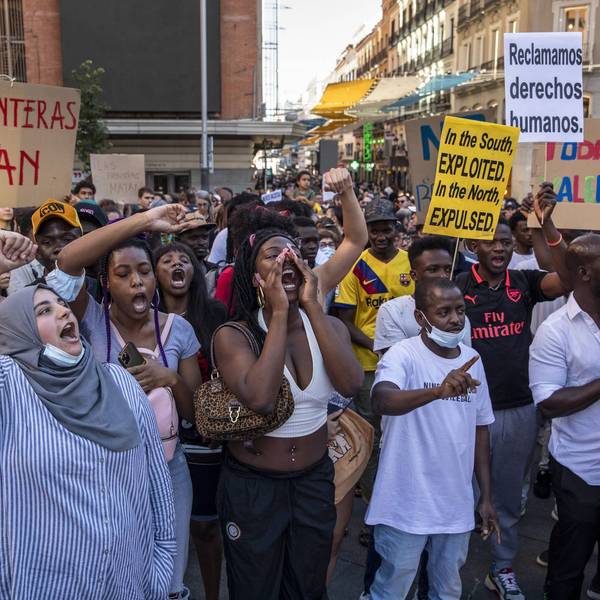Updated 6:39 PM EST
Spain's government appears to remain deadlocked after the leading political parties, including the ascendant leftist coalition Unidos Podemos, failed to win enough votes to secure a majority government.
The Guardian reports:
Despite exit polls suggesting that the far-left Unidos Podemos coalition was on course to stage a historic breakthrough by pushing the socialist PSOE into third place, the much-anticipated surge has not materialised.
With 80% of the vote counted, the [conservative Partido Popular] is set to take 135 seats, followed by the [socialist] PSOE with 89 seats, Unido Podemos with 71 seats, and the centrist Ciudadanos party, with 29.
The results follow the pattern in December, when the PP won 123 seats, with 29% of the vote, the PSOE 90 seats with 22%, Podemos 69 seats and 21%, while Ciudadanos took 40 seats with 14%.
Earlier:
Seeking a spark of light in the darkness that followed this week's Brexit vote, the European left has its attention firmly fixed on the Spanish election Sunday, where a coalition led by the populist Podemos Party could upend the conservative establishment and breathe new hope into a continental movement.
The Unidos Podemos coalition, which includes the radical leftist party along with communists and greens, is expected to make big gains in the repeat elections. Still, it is unclear if they will win enough votes to unseat Prime Minister and Popular Party leader Mariano Rajoy.
In recent days, Unidos Podemos surpassed the Socialists in the polls, shattering the historic two-party dominance and threatening the chances of a possible establishment majority. AFP explains:
The centre-right People's Party (PP) looks set to be the biggest party again, with around 120 seats. But its natural coalition partner, the liberal Ciudadanos ("Citizens"), appears likely to win only about 40 seats, leaving them well short of the 176 needed for a majority.
In theory, the rise of Unidos Podemos ("Together We Can"), a leftist alliance led by Podemos, could offer a way out. The 90 seats it is expected to win, combined with around 80 for the Socialist Party (PSOE), would be close to a majority. Support from some of the regional parties could enable them to form a government.
And for the Left mainly, the stakes are high, coming just days after voters in the United Kingdom decided to leave the European Union, which triggered similar referendums across Europe and has thrown Britain's opposition Labour Party into complete disarray.
"This is a crucial time for the Left. Our time has come. We have an opportunity for change," said Unidos Podemos supporter Carlos Martinez.
Writing for Jacobin, Pablo Castano Tierno notes that "success for the Left in Spain would have an impact across Europe":
Europe is facing a historical crossroad. Far-right parties are getting impressive electoral results in a growing number of countries, including Austria, France, Hungary, Poland, and the traditional conservative and social-democratic parties are embracing their xenophobic platforms.
At the same time, the mass protests that have taken place all across Europe since the beginning of the crisis haven't been able to stop the austerity policies. In this context the electoral path is unavoidable for the European radical left.
Castano Tierno concludes that a Unidos Podemos electoral success would "be a great step forward for the ensemble of European progressive and radical forces, and a source a hope across the continent."



